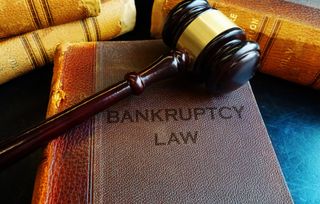Call Us Today!
803-649-0875
P.O. Box 1488, 106 Trafalgar St. SW Aiken, SC 29801
sheryl@andrewmarine.com
Bankruptcy Overview
Learning About Bankruptcy Basics

Federal law protects those who experience extreme financial distress by allowing them to declare bankruptcy. Depending on your individual financial situation, and the type of bankruptcy you seek, a bankruptcy attorney can help you obtain complete forgiveness of your debt or establish a repayment plan that allows you to make payments to creditors without liquidating your assets.
Chapters 7 & 13 are the most common forms of bankruptcy available to individuals who are interested in personal bankruptcy, and Chapters 7 & 11 are the most common for businesses. Although all three types of bankruptcy relieve the stress of overwhelming debt, they can have dramatically different effects on a debtor's financial circumstance.

Federal law protects those who experience extreme financial distress by allowing them to declare bankruptcy. Depending on your individual financial situation, and the type of bankruptcy you seek, a bankruptcy attorney can help you obtain complete forgiveness of your debt or establish a repayment plan that allows you to make payments to creditors without liquidating your assets.
Chapters 7 & 13 are the most common forms of bankruptcy available to individuals who are interested in personal bankruptcy, and Chapters 7 & 11 are the most common for businesses. Chapter 12 is most common for farmers. Although all these types of bankruptcy relieve the stress of overwhelming debt, they can have dramatically different effects on a debtor's financial circumstance.
Bankruptcy attorney, Andrew C. Marine, will help determine which form of bankruptcy is best for your situation as well as develop a custom solution for your debt problem. From the initial petition to negotiating with a trustee, Attorney Marine will work with you every step of the way to achieve your goals through bankruptcy. Call (803) 649-0875
to schedule a consultation today.
What is Bankruptcy?
Bankruptcy is a legal process that provides debt relief to individuals and businesses in financial trouble. The bankruptcy process accounts for the debtor's assets and liabilities, then provides a structure where the debtor is allowed to keep some, and in most cases, all property and ordered to satisfy as many eligible debts as possible, in order of priority established by law.
The stigma of bankruptcy has faded and is now seen as a fresh start after a time of extreme financial trouble. Most debtors have experienced unexpected financial shock, caused by job loss, business failure, death, divorce, illness and or other factors.
Filing bankruptcy may be the right answer. If you are facing serious financial challenges, contact Law Offices of Andrew C. Marine in Aiken, SC, to schedule a consultation with an experienced bankruptcy attorney who can help you assess your legal options.
Liquidation & Reorganization
Bankruptcy is an available option for individual consumers, businesses, farmers and municipalities. There are two major bankruptcy types: liquidation and reorganization.
Liquidation
The bankruptcy court will issue an "automatic stay" that stops most collection proceedings against the debtor. A bankruptcy trustee is responsible for gathering the debtor's nonexempt property, liquidating it and distributing the proceeds to the creditors. This process will leave some creditors' debts unpaid if there are not enough assets to cover liabilities. The remaining debts are discharged and are no longer a responsibility of the debtor; however, certain types of debt are nondischargeable like alimony or child support. For a business debtor, the liquidated business does not survive the bankruptcy.
Reorganization
Reorganization bankruptcy is more appropriate when there is steady income that can be used to pay creditors. Filing for reorganization also generates an automatic stay of most collection activity. The debtor, along with a bankruptcy trustee, develops a plan to pay debts over a three- to five-year period. At the end of the payment plan, remaining dischargeable debt is cancelled. If the debtor fails to make payments or fails to pay alimony, child support or other tax payments, the court can either dismiss the case or convert the reorganization to liquidation.
Address: P.O. Box 1488, 106 Trafalgar St. SW Aiken, SC 29801
Content, including images, displayed on this website is protected by copyright laws. Downloading, republication, retransmission or reproduction of content on this website is strictly prohibited. Terms of Use
| Privacy Policy
Phone:
(803) 649-0875
| Address: P.O. Box 1488, 106 Trafalgar St. SW Aiken, SC 29801 | Email: info@andrewmarine.com
Content, including images, displayed on this website is protected by copyright laws. Downloading, republication, retransmission or reproduction of content on this website is strictly prohibited. Terms of Use
| Privacy Policy
Phone:
(803) 649-0875
| Address: P.O. Box 1488, 106 Trafalgar St. SW Aiken, SC 29801 | Email: sheryl@andrewmarine.com
Content, including images, displayed on this website is protected by copyright laws. Downloading, republication, retransmission or reproduction of content on this website is strictly prohibited. Terms of Use
| Privacy Policy